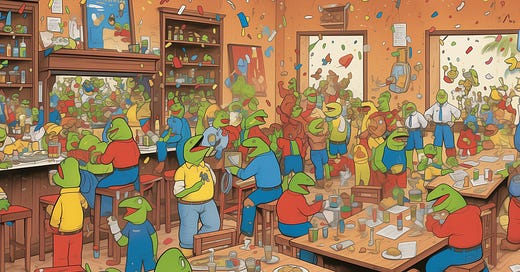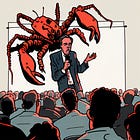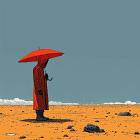So it’s come to this: A Bug-eyed and Shameless clip show.
Yes, after two-ish years, this newsletter has hit the triple digits: 100 dispatches.
It just so happens to coincide with another convenient milestone: 10,000 subscribers. (Or just-about, anyway. If you’re not a subscriber, sign up today and you could be lucky number ten thousand.)
When I began the newsletter, I gave it a year to see if it clicked — not only to see if people would subscribe and pay for it, but also to see if I would actually enjoy doing it. There is no worse project in life than one you no longer have any excitement for.
Two years on, and the readership for newsletter is still steadily growing, a loyal army of you keep paying for it, and I’m actually enjoying it more than I did in the beginning, having now settled into something resembling a style. (Semi-related historical anecdote, thesis statement, very related historical anecdote, 3rd party expert analysis or novel research, mountain of context and background, rushed hand-wavy conclusion.)
But this week, a break from format as we look back on some of the best of the newsletter — because, gosh knows, it wasn’t all good.
I’m also opening the comments to all subscribers to solicit some feedback: What do you want to see more of? What dead horses should I stop beating? Any books or research worth reviewing, interesting people worth interviewing, or old concepts worth reviving? Any burning questions you have about the newsletter and how the sausage gets made?
I also just want to send out a very genuine thank-you to everyone for reading and subscribing, with a particular acknowledgement to those who pay to keep this thing going. Also a huge shout-out to those who comment, reply, and share around these dispatches: Particularly frequent commenters Roy, Anne, Neil, Geoffrey, Adrian, Erwin, and all the others. (You can thank Erwin for an overall decline in typos in this newsletter, but you can’t blame him for any that still wind up in here.)
This week, on a very special Bug-eyed and Shameless, a look back on 100-ish dispatches.
Dispatch #1, #49: Remedial Virology
Someday, I suspect, we’ll forget many of the lessons we learned during the COVID-19 pandemic — that science is imperfect, but better than the alternatives; that social cohesion is stronger than we might think, but has its limits; that governments and the media are made up of real people, inclined to make mistakes. Hey, that’s life.
But I know we’ve already forgotten just how comically wrong the disinformation peddlers were about, well, everything. Whether it’s QAnon influencers anticipating that Donald Trump would uncover the plandemic, the governor of Florida vowing to prosecute all the vaccine crimes, or Tucker Carlson projecting that Disease X is just days away from shutting down society once more — being comically wrong never seems to hurt their credibility. Odd, isn’t it?
Dispatches #3, #39, #59: Don’t Icke My Yum
I always try, best I can, to avoid criticizing adherents to conspiracy theories or disinformation narratives. Belief is a funny thing, and lots of people end up in bad places for the right reasons. I try and save my ire for the morally bankrupt hucksters who wield these narratives for personal and professional benefit.
Whether it’s the man who stared at space reptiles (see: Jews), the plain-steak-stylings of Canada’s most embarrassing intellectual, or two men who give podcasting a bad name — understanding why these grifters and goons become popular is a critical path to understanding how we got to where we are today.
It strikes me that a lot of mainstream news coverage, these days, continues to devote a squirrel-like fixation on every bonkers tweet or bewildering off-the-cuff statement — yet still devotes far too little time to understanding the whole worldview and ethos of these conspiratorial influencers. I still think there’s value in that latter strategy. Expect more of these kinds of close-ups in the future!
Dispatch #16: [Borat Voice] My WEF!
Paranoia over the supposedly-all-powerful World Economic Forum has grown by such remarkable leaps and bounds in recent years.
The remnants of Canada’s post-Freedom Convoy activism were in Parliament just last week, warning that Klaus Schwab represents an imminent danger to the country. Alex Jones and Infowars are still reporting breathlessly on every word published by the Forum. Anti-WEF nuttery, which is really steeped in anti-Europeanism, has even taken hold amongst the European far-right.
I remain grumpy that much of the coverage of this WEF-panic refuses to engage with just how similar this metatheory is to more than a century of similar conspiracy narratives. If we refuse to see how history repeats itself, we risk legitimizing this paranoid shtick as genuine or good-faith — and it’s neither!
Dispatches #20, #51, #58: On Changing Minds
When I first began this newsletter, I imagined it as being primarily useful to keep tabs on emerging trends in misinformation and conspiracy theories. And yet, the more I wrote — and engaged with you fine folks — the more I’ve seen the limitations of just observing trends in political discord and have got a lot more curious about how to untangle it.
Through it, I’ve actually grown surprisingly cheery about the idea that we can, and should, find ways to actually talk to each other again. And while that can sound rather naive, a mix of strong historical examples and good social science has provided some pretty strong evidence that it will actually make a difference. It all has me thinking that we are starving for a public discourse that tries to reconcile divisions instead of exploit them for political gain. We just need people brave enough to pursue them.
Dispatches #8, #31, #48: Pride and Prejudice
Going back and re-reading these three dispatches, it was really jarring to see just how quickly the anti-Queer crusade moved over these past few years. It’s one thing to warn about how fragile and illusory minority rights are, and how effective reactionary politics can be, it’s quite another to see those warnings come to fruition over just a matter of months.
We are now seeing a most widespread, well-financed, concerted legislative assault on LGBTQ rights across the Western world, and a corresponding decline in support for Queer people in general. And the backlash isn’t over yet.
Dispatches #47, #63, #85: A Series of Tubes
The internet has become such a fundamental part of our lives that just repeating such a statement — the internet has become a fundamental part of our lives — feels condescendingly obvious.
And yet, considering that truism, we talk so little about how the internet ought to be organized, managed, and even fixed. We imagine it as so massive and decentralized that we couldn’t possibly do anything about it.
This defeatist attitude ignores the fact that the internet is often radically reformed by virtual nobodies. Bored nerds, college students, small start-ups, collections of like-minded users: These people are constantly shaping how the internet changes. Maybe it’s time we start thinking about which direction we want it to change.
Dispatches #68, #83, #102: Journalist, Heal Thyself
If I could issue an edict by which all journalists around the world had to abide, I’d mandate they spend one day each month thinking about their own profession — what’s working? What’s not? Why do we keep doing things that we know are making people hate us?
This newsletter often forces me to stop and ask myself those questions. And sometimes the answers are rather uncomfortable!
(Am I also realizing, in writing this right now, that the 100th edition of Bug-eyed and Shameless was actually a few dispatches ago? And that, due to a hiccup in my ledger, this is dispatch #103? Yes. Moving on.)
Dispatches #24, #88, #96: CanCon
This dispatch is pretty global in scope and attention. But sometimes I can’t help but focusing on my own backyard. And to that end, this newsletter has gone to some interesting places. We revealed that the (now) premier of Alberta had a habit for reading Holocaust denial blogs, that the leader of the opposition thinks I’m actually the source of the country’s disinformation problem, and that the prime minister still thinks he’s doing a wonderful job.
Canada is a particularly interesting case study: A net exporter of conspiratorial influencers and disinformation adherents; Justin Trudeau is the long-suffering dean of the 2010s liberal order; and we’re facing a particular strain of populist upsurge. Nobody, myself included, is quite sure if Canada is still mostly resisting the trend towards low-trust high-animosity politics, if it is merely late to the game, or if it will continue to be an exception to the Western rule.
I guess we’ll see!
Dispatches #64, #73: Polarity
Because I spent a significant chunk of time last year working on a report on the state of polarization, this newsletter wound up going there, too.
Here’s a little secret: Dispatch #64 might be my favorite edition of Bug-eyed and Shameless. While it probably could have used a few more edits for length, it was such a joy to write.
Dispatches #74, #76, #82: On Conflict
This newsletter fills a lot of roles for me: A reporters’ notebook, a chance to do some rather aimless research, an excuse to go deep on something I couldn’t sell an editor on. It is also a chance to think through major news events that I remain deeply conflicted about. The horrors of October 7 and the ensuing travesty of the war in Gaza are a prime example. This newsletter definitely helped me crystallize my views on the matter: Disgusted by those who would justify or glorify Hamas’ terrorism; radically against the premise of Benjamin Netanyahu’s war, adamant that international law must prevail. I hope these were helpful to you folks as well.
Dispatches #92, #93, #94: Slava Ukraini
Probably the most rewarding and meaningful thing I was able to do over the run of this newsletter — again, thanks to those who pay to subscribe — was to make it into Ukraine. After two years of harboring genuine guilt that I was unable to visit a country that I genuinely love as it faced an existential threat, finally coming back to Ukraine was genuinely impactful experience. Being able to write about my week there, at length, was really cathartic.
I’m hoping to return later this year or early next.
That’s it for this (very) special edition.
Like I said, please comment below with any miscellaneous thoughts.
Until next time!


































Don't always agree, but always appreciate. Thanks for doing this. It is a real perk (perk & perq) to read something thoughtful and literate.
I appreciate all hard work and deep thinking you do for your posts. I’ve been following your work since you were on Canadaland (I especially liked your recent return to short cuts a few weeks ago). I’m most interested in your Canadian content since it’s different from everyone else. Though I do understand you may want broader appeal so 100% Canadian may not be the best way to go.